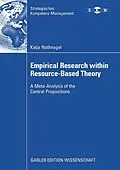During the last 20 years, resource-based theory has become one of the most important theoretical perspectives in the field of strategic management. Often criticized for not being subject to empirical research, the results of numerous empirical tests have yet to be compiled and compared.
Katja Nothnagel evaluates this growing body of empirical research in resource-based theory. She starts out by deriving six central propositions and then examines how these propositions have been tested empirically. Over 190 empirical resource-based papers are identified. The results of this work are evaluated through a narrative review, vote counting as well as the use of a meta-analysis. The results suggest that substantial progress has been made within the empirical part of RBT: (a) various operationalization examples on the propositions' central constructs prove that testing RBT propositions is possible; (b) vote counting results indicate an overall positive significant impact of resources on performance with negligible results in the opposite direction of the theory; and (c) meta-analysis results show significant positive relationships. The author concludes, however, that more research is needed regarding the factor market conditions and the operationalization of resource conditions.
Autorentext
Dr. Katja Nothnagel promovierte bei Prof. Dr. Thomas Mellewigt an der Fakultät für Wirtschaftswissenschaften, Lehrstuhl für Organisation und Strategie an der Universität Paderborn. Sie ist im Bereich Change Management and Strategy Development der Firma IMPAQ AG in Zürich tätig.
Zusammenfassung
In the last ten years, the Resource-Based View (RBV) has become an important theoretical approach in strategic management. Concurrently, or at least since the contribution of Priem/Butler, there has been an increase in criticism of the theoretical and empirical power of the RBV. In this context Katja Nothnagel identifies three main deficiencies in the present discussion on the RBV: 1. An inadequate understanding of the central constructs and the empirically revisable hypotheses of the RBV. 2. An insufficient comprehension regarding the state of the art of the empirical research on the RBV and therefore of the empirical power of the RBV. 3. An inadequate systematic in respect to the methodical problems and the evaluation of alternative methods of research. This is the starting point of Katja Nothnagel's thesis, in that she aims to contribute to the elimination of all three deficiencies. Firstly, she concentrates on the ten most important theoretical publications on the RBV and thus identifies the three central constructs: resources, performance, and markets. These three central constructs are described in detail and defined. This represents an essential step in the establishment of a theory. Based on this she develops six central empirically revisable hypotheses for the RBV.
Inhalt
The Central Propositions of Resource-based Theory.- Review of Empirical Research within RBT.- RBT: Vote Counting and Meta-Analysis.- Methodological Challenges regarding RBT.- Conclusion and Future Research Agenda.
